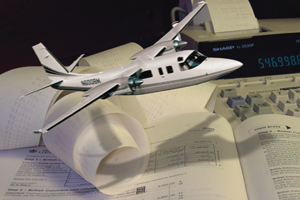Aircraft Owners Should Take Advantage of Temporary Tax Act
By Louis M. Meiners, Jr.

Congress recently enacted a new tax act that significantly impacts not only income taxes, but also estate and gift taxes. Unfortunately, the provisions of this act are temporary and generally expire at the end of 2012. The provisions of this new law may provide significant opportunities for operators of owner-flown aircraft to benefit from the law beyond 2012 through strategic positioning. Although the law will certainly change for 2013 and beyond, it may be possible to lock in the benefits of these temporary provisions on a long-term basis through asset transfers, ownership strategies, and gifting. Of course, tax planning can never be performed in a vacuum. This is particularly true for operators of owner-flown aircraft. Owner-flown aircraft operators often have significant issues not shared by the general population. These often include:
- Insufficient liability insurance for aircraft operations commensurate with their net worth.
- Substantial income tax liability and potential savings from business deductions.
- Aircraft that have been depreciated for income tax purposes but retain substantial value.
- Complex business arrangements involving partners or other revenue-sharing arrangements.
- State tax issues related to interstate businesses, or multiple residences in different tax jurisdictions.
- Potentially large federal estate tax liability, particularly after 2012.
The purpose of this article is to identify major areas concerning structuring ownership and contractual opportunities. This article is the first of a series designed to encourage examination of goals, identification of liability and tax exposure, and analysis of alternative solutions.
Personal Observation
I�m a 60 year-old pilot with nearly 6,000 flight hours who holds a law degree (but does not practice), holds a CPA license, and holds endorsements for multiengine, instrument, seaplane, and a type-rating in a jet. Over the last 20 years I have assisted countless aircraft operators, primarily in North America, with regulatory, tax, liability, and business issues. The discussion that follows is not intended to be comprehensive, just memorable to a seasoned veteran.
Mission and Operational Issues
Before one can explore if they hold and operate the aircraft in the most effective manner for liability and tax considerations, they must first consider why they own and operate the aircraft, and if it is the right equipment in light of their mission needs. This evaluation often considers the following issues:
- Does this aircraft properly suit my mission on 75 percent of my trips? Unless your mission never changes, your aircraft will not provide the perfect match for 100 percent of your trips without providing significant excess capacity.
- Does it suit your budget? It is important for the operator to separate the cost between fixed and variable and evaluate how that impacts the cost-per-mile of travel at the current level of usage. This is particularly true when evaluating the viability of replacing older, less-efficient aircraft with a more expensive capital investment but lower cost-per-mile newer equipment.
- Should you share your aircraft? Aircraft owners often find they can achieve a significant reduction of fixed costs per mile by increasing their utilization through a sharing arrangement. This can be accomplished through a block rental agreement, a charter arrangement, or perhaps leasing it on a short-term basis to companies or individuals. Aircraft sharing comes with a cost of loss of availability and flexibility for the operator, and it is important to recognize that, although increased usage may increase cash flow, it will impact maintenance costs and residual value of the aircraft.
- If you put your aircraft in your primary business, how do you get it out upon sale of the business, or how will it impact your partners? Part of the popularity of single-purpose entities for aircraft ownership is driven by the economic need to separate aircraft burdens and benefits from the primary businesses it supports. Although this can generally be accomplished, there may be significant tax and liability considerations that must be integrated into this operational plan.

Sales and use taxes on aircraft purchases and maintenance is often controllable through planning. State tax laws relating to sales and use tax often provide exemptions such as resale exemptions, casual sale exemptions, or commercial use exemptions that may be available through proper planning. Aircraft generally travel in interstate commerce and a new area of exposure is emerging where states seek to tax non-resident visitors with use tax for the privilege of landing at their airports. There are limitations imposed by the federal constitution on the right of taxing authorities to tag occasional users, but nonetheless this appears to be a growing area of concern for aircraft operators. Property taxes are also often imposed on aircraft. For resident aircraft they are generally assessed on where the aircraft resides on its assessment date or the majority of the time during the preceding year. This again is an area where states may attempt to tax non-residents who are visiting an airport on the assessment date. Although there may be valid defenses against these tax assessments, states generally have lien rights and the fear and cost of litigation serve as tools of the states to effectively force taxpayers to satisfy questionable tax assessment.
Income Tax Issues
Income tax issues abound for an investment as significant as an aircraft. Although income tax issues are only one element of how an aircraft should be owned and operated, the following considerations often play an important role:
- Does the aircraft purchase, or its improvements, qualify for 100 percent bonus depreciation, or expensing under Section 179? Bonus depreciation applies only to new equipment, and Section 179 deductions apply only to small business taxpayers and are limited in amount. It is important to recognize that for both bonus depreciation and 179 deductions, property only qualifies if it may be depreciated under the Modified Accelerated Cost Recovery System depreciation (MACRS). MACRS depreciation is available only for equipment used more than 50 percent in business and contains certain limitations for property used for personal purposes and leased to related parties.
- Unclaimed depreciation may be a tax loss. If a taxpayer uses an aircraft in business and deducts the related expenses, but chooses not to depreciate it, the basis of the aircra
- Is the aircraft used for business, or is it a hobby? A business owner must have a genuine expectation of economic profit from the activity in order to deduct expenses in excess of the activity�s income.
- Is the taxpayer actively engaged in the aircraft business or is it a passive activity, or rental activity? Generally speaking, in order to utilize tax losses, the business involved must not be a rental activity, and the taxpayer must materially participate in it.
- Does the taxpayer have an income tax basis in the airplane entity? It is important to note that borrowed funds generally constitute basis for a limited liability company taxed as a partnership, but not for an S-corporation.
- Is the taxpayer at risk in the aircraft activity?There must be potential personal liability should the entity fail to make payments on the underlying asset.
- Do you qualify for grouping your airplane activity with the businesses it serves? For purposes of passive activity and hobby-loss rules, taxpayers may at times treat assets held in different entities on a combined basis. For example, a company owning two separate subsidiaries, one of which simply owns a plane, and the other of which operates a business, may often, if the subsidiaries together represent a logical economic unit, group the two subsidiaries� activities in determining whether or not the aircraft is a hobby and whether or not it is an active trade or business. An affirmative election declaring the grouping should be filed with the tax return.
Liability Issues
It is safe to assume that all owner-flown aircraft operators are underinsured for liability purposes for the most catastrophic potential accident. Aircraft liability insurance that is sufficient even to adequately cover potential liability from passengers is generally not available. It is therefore important for aircraft owner-operators to recognize their potential liability exposure for losses beyond insurance coverage, and consider how might they control it. First, it is important to recognize that not all of an individual�s assets are subject to attachment by creditors. For example, pension and profit-sharing plans, and IRAs, are often protected from claims of creditors by federal statute. However; the balance of exemptions from creditors is determined by state law, and varies significantly. For example, some states exempt your primary residence, others exempt it only when it�s held by husband and wife, and still others exempt it only up to a certain dollar amount. Some states exempt all real property held by husband and wife, while others only exempt residential property. Some states exempt life insurance policies and annuities, while many do not. Some states allow you to transfer your property into trusts and protect it, while others do not. A liability review should therefore encompass the following items:
- Recognize the exemptions available in the state of your residence, or in other states where you own property.
- Consider transferring property from its present form of ownership to an exempt form of ownership.
- Isolate and insulate assets with high liability exposure, such as your aircraft operation, from other assets of significant net worth.
- To the extent that you have significant equity in an asset such as an aircraft with potential large liability exposure, consider converting it to debt.
- Recognize that corporations or limited liability companies do not have state or federal exemptions from attachment from creditors, and it may therefore be advisable to protect entity equity from assets with significant liability exposure.
Estate and Gift Tax Issues
The most significant provisions of the 2010 Tax Relief Act for many taxpayers relate to estate and gift tax. These provisions are in place only for 2011 and 2012, so prompt action is necessary to reap long-term benefits. The most significant provisions for most taxpayers are the following:
- The estate, gift, and generation-skipping tax exemptions increase from $1,000,000, to $5,000,000.
- There is a new portability provision that introduces the concept that the unused exemption of the estate of the first spouse to die is available for use by the second spouse to die. This in effect allows a married couple to have $10,000,000 exempt from federal estate tax provided they both die before 2012.
Assuming that both spouses are not willing to die before the close of 2012 in the interest of saving estate and gift taxes, they should consider alternatives such as gifting to accomplish a similar result. It may be possible through the use of trusts to lock in a long-term benefit of the temporary $5,000,000 exemption. Under the right circumstances this could work quite effectively in conjunction with controlling liability of aircraft operations.
Conclusion
From now through the close of 2012 there is a unique opportunity (particularly for taxpayers with a net worth in excess of $1,000,000) to reap long-term benefits from temporary estate and gift tax changes in the course of a review of how they own and hold their aircraft considering operational, liability, and tax issues. In this complex area it is important to recognize the need for assistance from a qualified advisor.
Lou Meiners is a consultant with Advocate Consulting Legal Group, PLLC, a law firm whose practice is limited to serving the needs of aircraft owners and operators relating to issues of income tax, sales tax, federal aviation regulations, and other related organizational and operational issues.
IRS Circular 230 Disclosure. New IRS rules impose requirements concerning any written federal tax advice from attorneys. To ensure compliance with those rules, we inform you that any U.S. federal tax advice contained in this communication (including any attachments) is not intended or written to be used, and cannot be used, for the purpose of (i) avoiding penalties under federal tax laws, specifically including the Internal Revenue Code, or (ii) promoting, marketing or recommending to another party any transaction or matter addressed herein.
Discuss this article in the forums...







